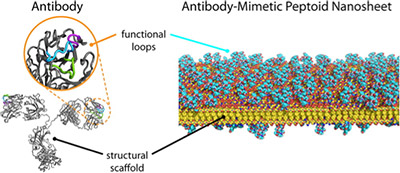Adapted from this Berkeley Lab Press Release

Taking inspiration from the human immune system, researchers at the Molecular Foundry have created a new material that can be programmed to identify an endless variety of molecules. The new material resembles tiny sheets of Velcro, each just one-hundred nanometers across. But instead of securing your sneakers, this molecular Velcro mimics the way natural antibodies recognize viruses and toxins, and could lead to a new class of biosensors.
Nanosheet scaffolds are self-assembled from peptoids – synthetic, bio-inspired polymers capable of folding into protein-like architectures. Like beads on a string, each peptoid molecule is a long chain of small molecular units arranged in a specific pattern. In earlier work, the research team showed how certain simple peptoids can fold themselves into nanosheets just a few nanometers thick but up to one-hundred micrometers across – dimensions equivalent to a one-millimeter-thick plastic sheet the size of a football field. In addition to possible diagnostic and sensing applications, this work represents an important step toward extending the rules of protein folding to the world of synthetic materials.

